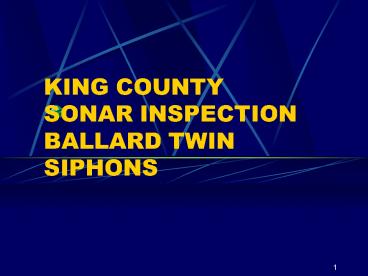KING COUNTY SONAR INSPECTION BALLARD TWIN SIPHONS - PowerPoint PPT Presentation
1 / 44
Title: KING COUNTY SONAR INSPECTION BALLARD TWIN SIPHONS
1
KING COUNTY SONAR INSPECTIONBALLARD TWIN SIPHONS
2
INTRODUCTION
- The Ballard twin siphons were constructed in the
mid-1930s using wood stave pipe. - The pipe is comprised of 21 creosoted wood staves
of 2 inch by 6 inch stock, resulting in a nominal
36 inch inside diameter. - The survey was conducted from October 31st to
November 3rd in 2005.
3
SONAR SYSTEM
- The sonar system employed a 2.2 MHz rotating head
sonar system. - A gyro-stabilized attitude and acceleration
navigation system was used to provide orientation
and position data. - Communication with the sonar carried via a fibre
optic cable operated from a winch on the upstream
(north) side of the siphon. - A cable payout counter recorded the probe
position as the instrument was moved through the
siphon, and load cells monitored the amount of
strain on each cable.
4
ROTATING HEAD SONAR
5
SCOPE OF WORK
- The project entailed carrying out a sonar
profiling inspection of the Ballard siphons. The
purpose of the inspection is to assess the
condition of the wood stave pipe and to ascertain
the level of sediment in the pipe.
6
North Station Draw Works
7
Sonar System Probe
8
North Station Probe Launch
9
Marco Marine (South) Station
10
SURVEY RESULTS - West Siphon
- Cross-section change extending from 100 feet to
150 feet. - Abrupt change the 100 foot mark with a tapering
of the effect at a distance of 150 feet. - A peak value of 17.9 percent obstruction of the
pipe over the nominal 36 inch equivalent is
measured.
11
SURVEY RESULTS - West Siphon
Distance 103.9 feet
Distance 152.9 feet
12
3D View with Wood Stave Grid
13
Ballard West 90 to 160
14
SURVEY RESULTS - West Siphon
- 275 to 305 feet - percent obstruction value of
10.8 percent. - 425 to 480 range, with a peak obstruction of 19.8
percent.
Distance 463.0 feet
15
Ballard West 410 to 480
16
SURVEY RESULTS - West Siphon
- 750 to 1035 foot range in the central area of the
horizontal section. - Percent obstruction in the 15 percent range, with
a peak values in the 18 percent range. - Calculated sediment volume of 834 cubic feet.
Distance 1002.1 feet
17
SURVEY RESULTS - West Siphon
- A more subtle cross-section change in the 1205 to
1220 foot range.
Distance 1205.7 feet
18
SURVEY RESULTS - East Siphon
- Similar zonation to that observed in the west
siphon. - Debris 80 to 110 feet.
- Change in cross-section of the siphon from 115 to
210 feet
Distance 128.7 feet
19
SURVEY RESULTS - East Siphon
- The central horizontal run in the east siphon
shows lesser debris accumulation - East siphon carries only peak flows.
- Calculated sediment volume is 551 cubic feet.
Distance 800.1 feet
20
Ballard East 760 to 830
21
SURVEY RESULTS - East Siphon
- Cross-section change at 1195 to 1210 feet.
- Coincident with a similar feature on the west
siphon.
Distance 1203.2 feet
22
KING COUNTY SONAR INSPECTIONFREMONT TWIN SIPHONS
23
INTRODUCTION
- The system consists of a nominal 59 inch siphon
that carries the normal flows, together with a 47
inch siphon intended to handle peak flows. - The survey was conducted from November 28th to
30th, 2005.
24
SCOPE OF WORK
- The project entailed carrying out a sonar
profiling inspection of the Fremont Siphons. The
purpose of the inspection is to assess the
condition of the siphons and to ascertain the
level of sediment accumulation in the pipes.
25
Fremont North Station
26
Sonar System Probe
27
North Station Probe Launch
28
South Station Draw Works
29
SURVEY RESULTS - West Siphon
- Sonogram within forebay is shown here.
- The image shows the water level in the forebay as
a central horizontal reflector.
Distance 10.1 feet
30
SURVEY RESULTS - West Siphon
- Access riser pipe entering 47 inch siphon.
- Similar response is seen passing the riser pipe
at the end of the traverse, at a distance of 463
feet.
Distance 27.3 feet
31
SURVEY RESULTS - West Siphon
- Clean cross section with no evidence of debris or
sediment. - North descending segment to 84 feet.
- Horizontal segment to 410 feet.
- End of survey at 465 feet.
Distance 152.5 feet
32
SURVEY RESULTS - East Siphon
- East siphon (59 inch) carries the normal flows.
- A small degree of sedimentation at the 390 foot
mark.
Distance 389.2 feet
33
SURVEY RESULTS - East Siphon
- Except for the 390 foot zone, clean
cross-sections with no evidence of sediment or
debris. - No anomalous pipe wall conditions were noted.
Distance 360.3 feet
34
Fremont East 390
35
KING COUNTYSONAR INSPECTIONHIGHWAY 520 SIPHON
36
INTRODUCTION
- The sewer system consists of a 42 inch gravity
pipe that carries the normal flows, together with
a 108 inch siphon designed to handle peak flows. - The survey of the Highway 520 Montlake Crossing
Siphon was conducted on December 1st, 2005.
37
SCOPE OF WORK
- The project entailed carrying out a sonar
profiling inspection of the Highway 520 Montlake
Crossing Siphon. The purpose of the inspection
was to assess the condition of the 108 inch
siphon and to ascertain the level of sediment
accumulation in the siphon.
38
South Station
39
Sonar System Probe
40
South Station Vault Entry
41
North Station Draw Works
42
SURVEY RESULTS
- Sonogram from the forebay
Distance 14.3 feet
43
SURVEY RESULTS
- Clean section with no evidence of debris or
sediment. - No evidence of wall damage, pitting or erosion is
seen.
Distance 48.6 feet
44
SURVEY RESULTS
- Manhole entry at the 38 foot and 170 foot.
Distance 170.1 feet































